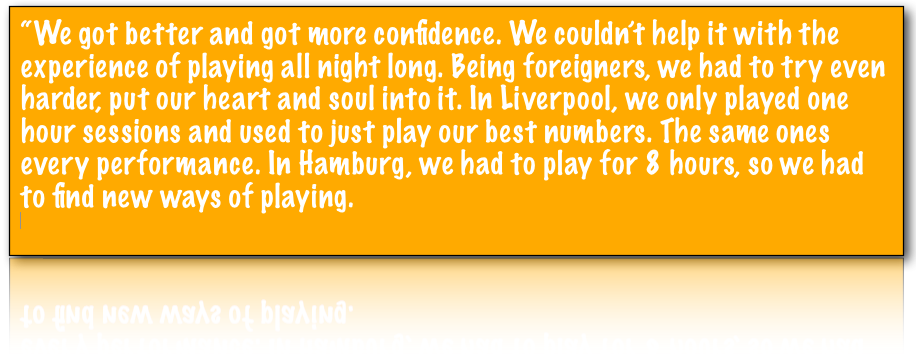What can we learn from how the Beatles became great?I wrote a blog post yesterday about Malcolm Gladwell and the 10,000-hour rule that he speaks about in his book Outliers. It was a blog post aimed at getting teachers to think about the role that reflection plays in their professional lives. I'd like to mention a couple of things here. Firstly, I failed to mention that it was not Gladwell who actually developed the 10,000-hour rule. The 10,000-hour rule originated in the work of psychologist Anders Ericsson from Florida State. Thanks to Shane Pill, a lecturer from Flinders University in Australia for letting me know this. Shane brings a lot to our #physed network on Twitter. Shane also brought up a great point that deliberate and purposeful practice is essential in order to become more effective educators. It made me think about the best balance that I had described in yesterday's blog post which was 80% teaching and planning time versus 20% teacher reflection time. I believe that deliberate and purposeful practice must be embedded within this 80%. This 80% also includes collaboration time with colleagues and professional development time. My main point was to stress that teacher reflection plays a pivotal role in everything we do no matter how things are broken down. Without reflection we merely go through the actions of teaching and assessing ultimately watering down our effectiveness as educators. As I listened to more of the Outliers audiobook today, I heard a part in which Gladwell speaks about why the Beatles were so incredibly successful. At the time that they were starting to get noticed, they were asked to go over to Hamburg, Germany (which was considered to be foreign land back in those days compared to their home of Liverpool) to perform several times over a span of 18 months. Although they were a pretty good band at the time. when they started doing gigs in Hamburg, they weren't a great band yet. Once they had finished up the 18 months, they were world class. After the Beatles broke up, John Lennon while being interviewed spoke about their amazing success and was quoted as saying: What key points does Lennon make that can be applied to becoming master teachers? It is so easy to fall into a pattern of continually doing the same things in our teaching, even if these things are very good. When the Beatles played in Liverpool they performed the same numbers over and over. It made them great at a few songs, but not master musicians, not yet anyways! It wasn't until they were forced to change things up and to find new ways of playing that they achieved true excellence.
When we reflect on our own teaching practice, it is essential to consider how we can constantly change things up and find new ways to teach, assess, and challenge our learners. In doing so, we will find the spark needed to continue to push our teaching to new levels. It's hard work but well worth the time and effort.
1 Comment
Jay Brittles
7/30/2014 12:55:13 am
Excellent blog post.
Reply
Leave a Reply. |
AuthorKAUST Faculty, Pedagogical Coach. Presenter & Workshop Leader.IB Educator. #RunYourLife podcast host. Archives
September 2022
|
- Welcome
- All Things Teaching and Learning
- The Aligned Leader Blog
- Consulting and Coaching Opportunities
- My TED X Talk
- My Leadership Blog
- Run Your Life Podcast Series
- How PYP PE with Andy Has Helped Others
- Good Teaching is L.I.F.E
- The Sportfolio
- Example Assessment Tasks
- PYP Attitude Posters (printable)
- Publications

 RSS Feed
RSS Feed
